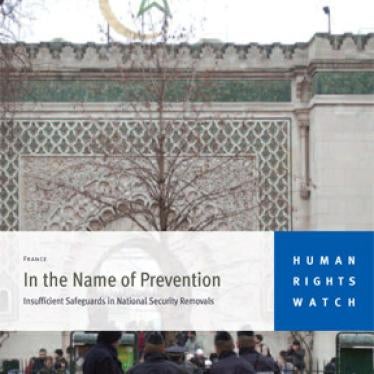The European Court of Human Rights decision to order France to suspend the deportation of an Algerian is a reminder that France’s expulsion policy may put people in harm’s way, Human Rights Watch said today. On April 23, 2008, the court ordered France to halt Kamel Daoudi’s deportation until it could review the case and issue a final decision on whether or not he could face torture or ill-treatment in Algeria.
Under current procedures in France, individuals facing deportation can apply to a special judge for a stay on human rights grounds. But even appeals based on fear of torture or ill-treatment do not automatically suspend the deportation until and unless the special judge orders the stay.
“This case shows why France needs an automatic, in-country appeal process for those facing deportation,” said Judith Sunderland, researcher on Western Europe at Human Rights Watch. “Otherwise, the European Court of Human Rights will keep having to step in.”
Daoudi, a 34-year-old Algerian, was released from prison on April 21, 2008 after serving a six-year sentence for a terrorism-related conviction, and was immediately placed in a detention center pending deportation. He was convicted in 2005 under the broad charge of “criminal association in relation to a terrorist undertaking.” In addition to the prison sentence, the French court ordered that Daoudi be criminally deported after serving his sentence and banned him permanently from re-entering French territory. The trial drew attention because the prosecution alleged that Daoudi and his co-defendants had plotted an attack on the US embassy in Paris. The only evidence presented of a plot against American interests in Paris was the confession of a suspect held in the United Arab Emirates that the appeals court excluded because of concerns about the conditions under which it was obtained.
The United Nations Committee Against Torture has condemned France twice in the past three years for deporting individuals to countries where they faced a risk of torture. In both cases, France had ignored requests from the committee to stay the deportation until the committee had time to study the facts.
“France has the right to remove foreign nationals who pose a real risk to national security,” Sunderland said. “But it has an absolute obligation under international law to make sure it never sends someone to a place where there is a reasonable risk they could face torture.”
Terrorism suspects expelled to Algeria are likely, on arrival there, to be detained and held by the Department for Information and Security (DRS) for up to 12 days in incommunicado detention. On April 15, 2008, France expelled to Algeria Rabah Kadri, an Algerian convicted on terrorism charges in a separate case; he has not been heard from since. The DRS, Algeria’s military intelligence service, is known for mistreating suspects in its custody, and alleged terrorists are at particular risk. Two Algerian terrorism suspects deported from the United Kingdom in 2007 were threatened and physically mistreated during their 12-day DRS detention and were subsequently convicted by an Algerian court on the basis of their “confessions.”
Since 2001, France has forcibly removed dozens of foreign residents accused of links to Islamist terrorism and extremism following procedures that do not provide sufficient protections against rights violations. In a June 2007 report, “In the Name of Prevention: Insufficient Safeguards in National Security Removals,”Human Rights Watch documented how the lack of guarantees in deportation procedures undermines human rights and alienates communities whose cooperation is critical to the fight against terrorism.
Background
Daoudi moved to France with his family when he was 5 years old. He acquired French citizenship in early 2001; he was stripped of this after his arrest in late 2001, paving the way for the deportation.
Five others were convicted along with Daoudi. Another Algerian national, Nabil Bounour, was the first one to be deported after serving his six-year sentence. Johan Bonte, sentenced to one year in prison, is a French citizen. The three other co-defendants were stripped of their acquired French citizenship after the conviction and ordered expelled by the Interior Ministry on national security grounds. Rachid Benmessahel and Abdelkrim Lefkir were sent to Algeria in 2007. A French court convicted Djamel Beghal, considered the leader of the group, on the basis of confessions he had made in the United Arab Emirates. Beghal alleges he was forced to confess under torture, and a medical exam in France upon his extradition found some traces of the kind of treatment Beghal described. Although the appeals court ultimately excluded that testimony because it was obtained under “conditions not compatible with the respect of the rights of defense,” it upheld the lower court’s conviction. Beghal was stripped of his acquired French citizenship in 2006 and he will face immediate expulsion once he finishes his 10-year prison sentence.







